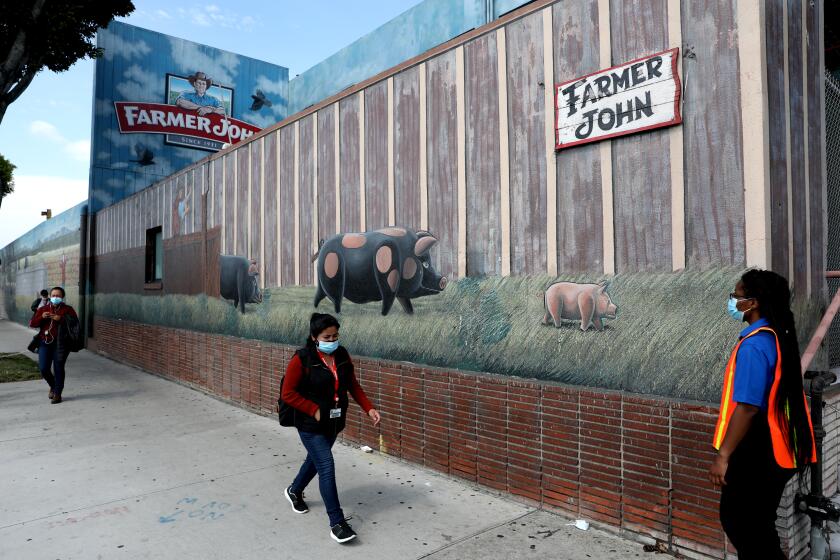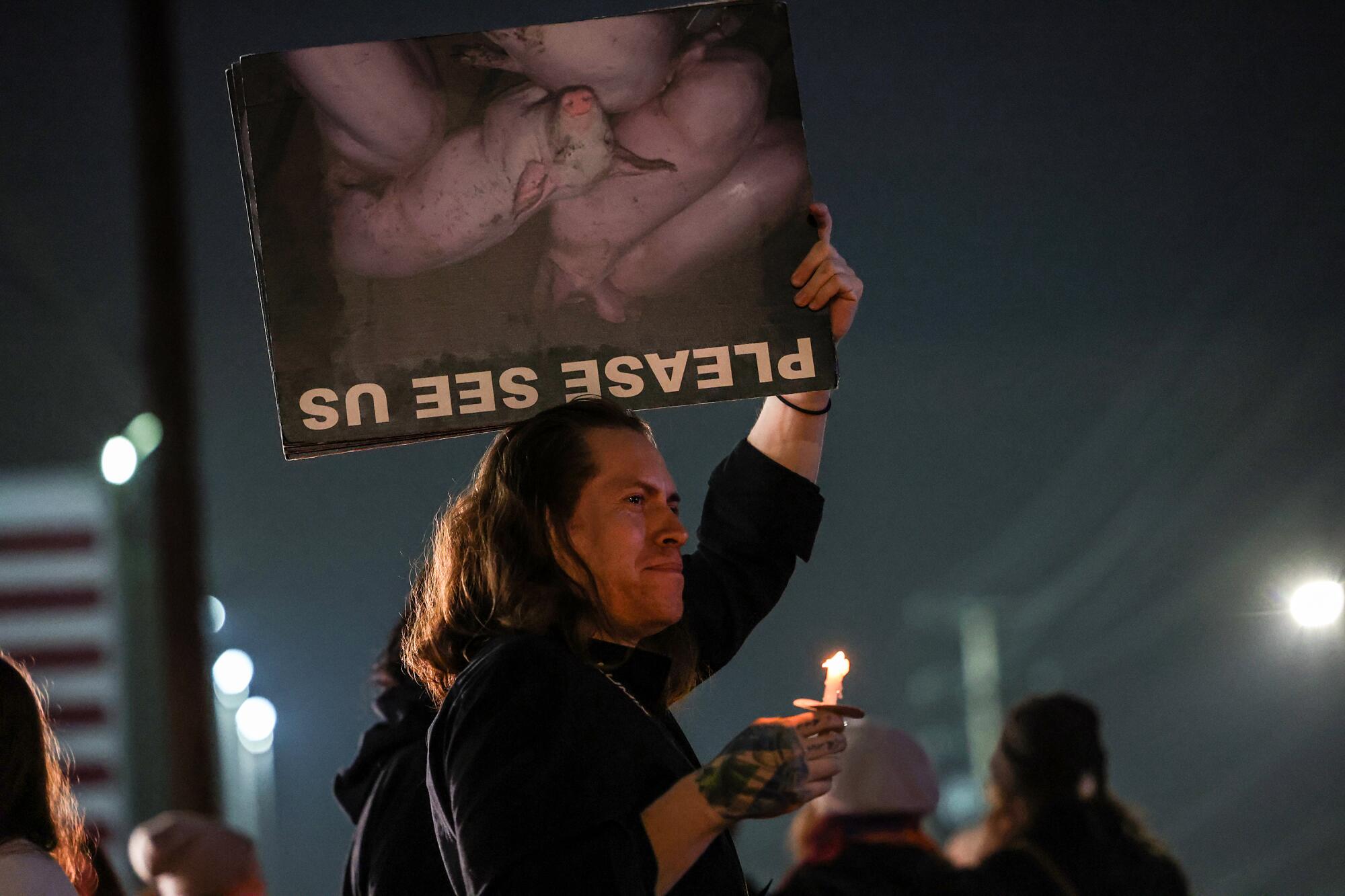
- Share via
Ellen Dent approached a microphone outside the Farmer John meatpacking plant in Vernon on Thursday night with a stunned look on her face.
It was the last official week of business for the iconic facility. Farmer John’s parent company, Smithfield Foods, maintained that the closure was necessary because of the supposedly escalating cost of doing business in California. Crowds had gathered since Sunday to celebrate. They had held up protest signs as double-decker livestock trailers packed with pigs rumbled into the plant. The famously vegan musician Moby spoke one night. So did San Jose-area Assemblymember Ash Kalra, the only vegan in the California Legislature.
On this night, the plant’s last, about 130 people stood around Dent, executive director of the nonprofit Animal Alliance Network, which had helped to hold twice-a-week “pig vigils” almost uninterrupted for the past seven years. White rose petals decorated the asphalt. Above her, graphic slaughterhouse scenes were projected upon a wall. Red hazard lights flashed alongside the curbs.
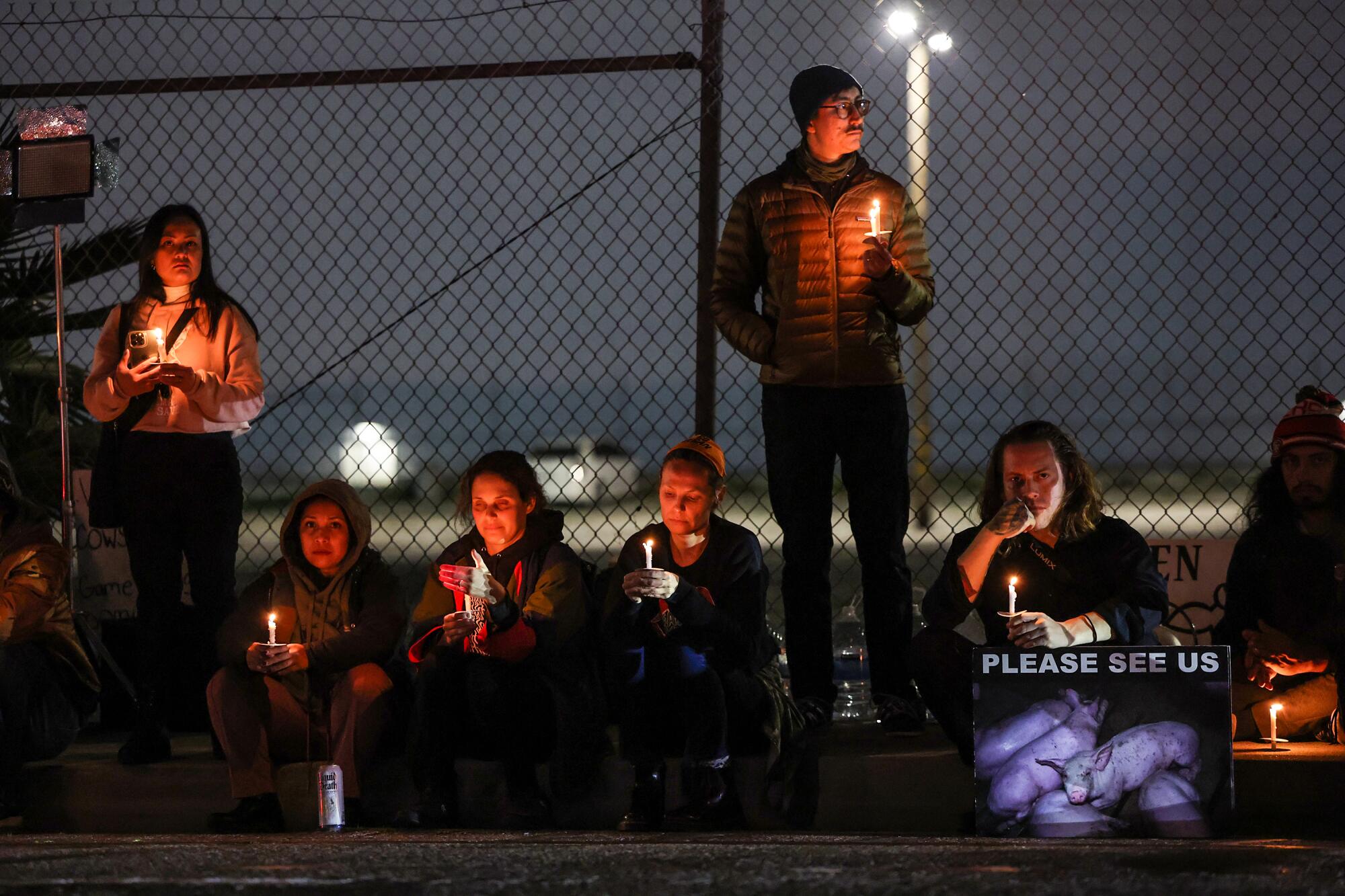
Dozens had protested outside Farmer John since that afternoon. Dent expected to stay until 3 in the morning, or whenever the last 18-wheeler dropped off its cargo. Everyone assumed they’d get one last chance to see pigs led to their deaths. But no truck had passed by all day. Now, Dent told those present, she knew why.
“Last night was the last night for the delivery of pigs,” Dent said with a calm voice and wide-open eyes. A worker inside had just called her with the news. “This is the closing-down event. You’re part of this history. Let’s shut this place down with style.”
A quiet cheer went up. Friends and strangers swarmed her with hugs. Independent journalists took photos and livestreamed.
“It’s bittersweet, because this factory will be replaced with another one in the Midwest,” she told me. “And we won’t be able to get a crowd out there. That’s what they’re doing. They’re running.”
It was an unexpected end to an unlikely relationship between a pork empire and animal rights activists.
Maya Benperlas stood in the middle of busy Vernon Avenue on a chilly Sunday night as a big rig hauling pigs slowed to a halt just outside the gates of Farmer John.
For years, Smithfield Foods — the largest pork producer in the world — allowed people to give the pigs water while truckers waited for the plant’s gates to open. This act of compassion earned international coverage. Celebrities like Joaquin Phoenix, Rooney Mara and No Doubt bassist Tony Kanal stopped by. Some of the Vernon police officers who kept watch even turned vegan.
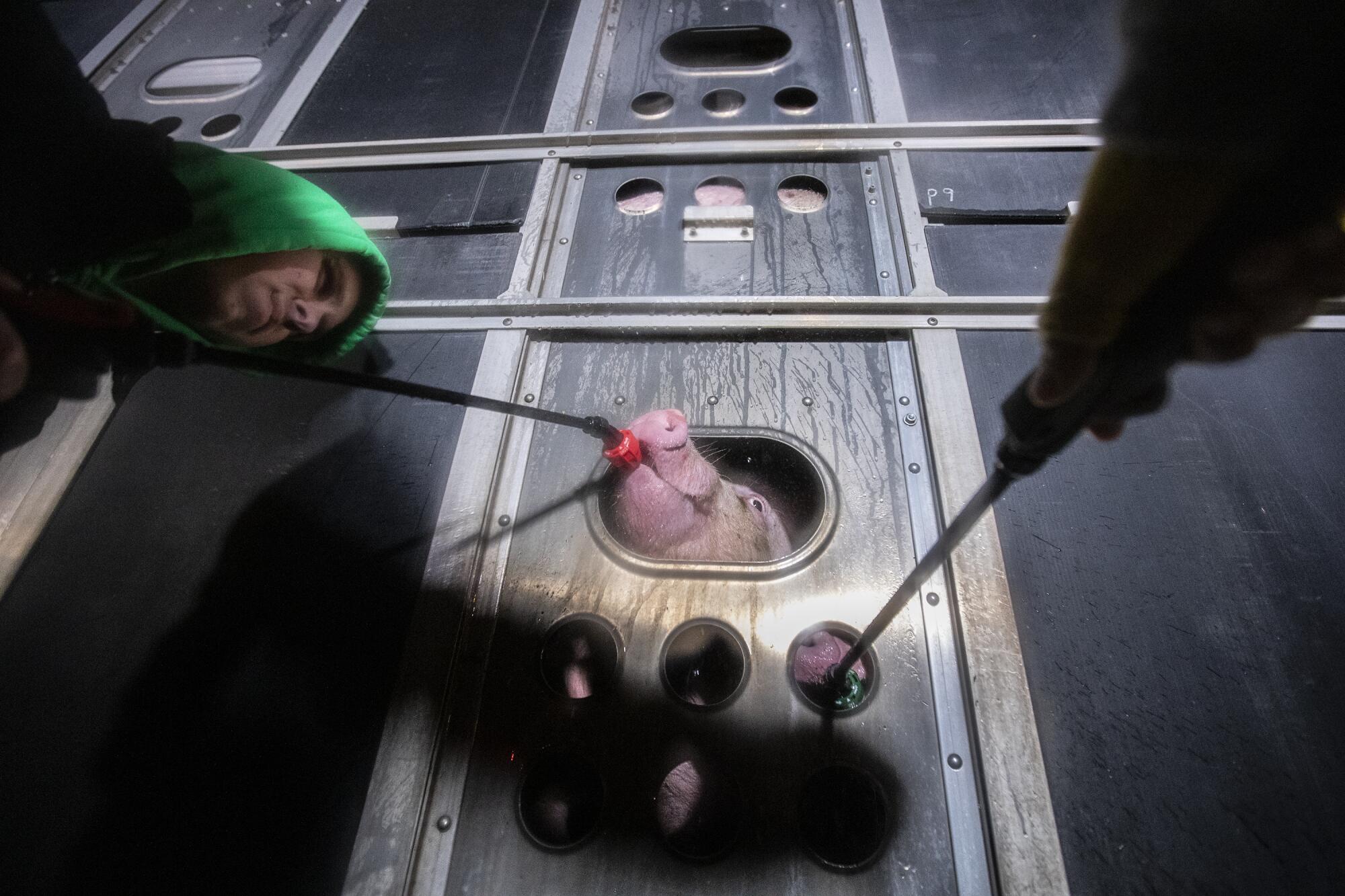
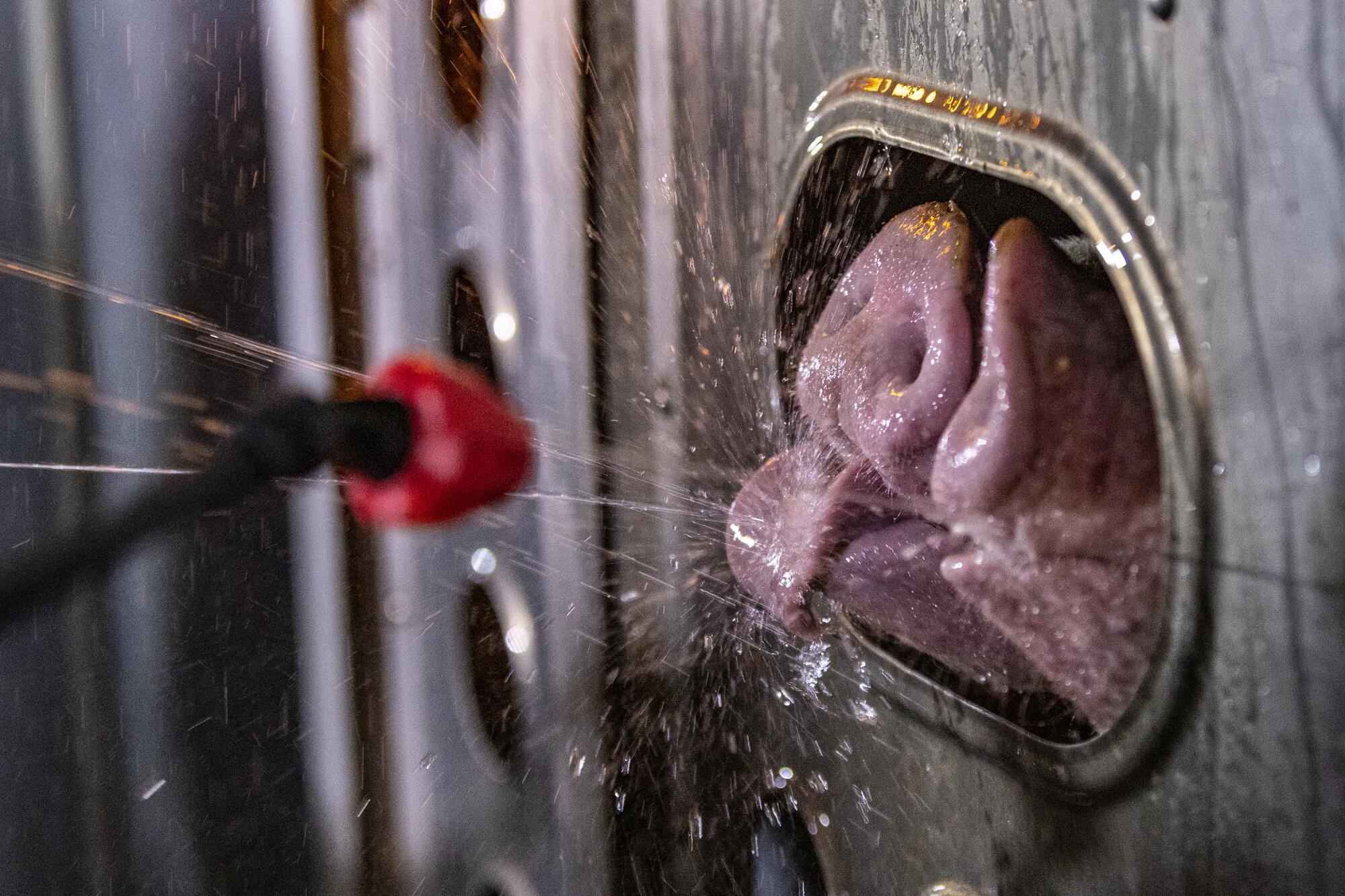
Like most other détentes between opposing groups over the past couple of years, the goodwill didn’t last.
In 2020, 20 protesters were arrested for blocking trucks, while seven others were cited for entering the plant and trying to make off with a pig. Smithfield declared a total ban on approaching the trailers, which carried to the present day. Jim Monroe, Smithfield vice president of corporate affairs, said that “any interaction like [letting strangers give pigs water] would be considered a violation of sound food safety and animal health practices.”
The vigils continued. Participants believe their continued presence is what led to the plant eventually shutting down.
Before Dent’s speech, Kassidy King and Shailee Prince, both of Sun Valley, sat in front of one of Farmer John’s massive gates. King was a newcomer, Prince a regular.
“We made noise. We made them uncomfortable,” Prince said as she flashed a peace sign at a honking van.
A block away, Jonathan Ohayon and other chefs served free food — vegan, of course. Plant-based jerky. Cajun fries. Chili. Chocolate bars.
Ohayon, a French immigrant who lives in Redondo Beach, regularly attended the vigils before the pandemic.
“We made a promise to see this plant close one day,” he said as he scraped off a griddle to make strawberry crepes. “And today is the day.”
If there was disappointment that no pigs were coming, no one showed it.
Vendors hawked hoodies and T-shirts. A volunteer wearing a neon green vest and holding a flashlight slowed down approaching cars. Police cruised around, sometimes parking to chat with leaders but otherwise letting folks do their thing.
A Farmer John worker occasionally popped his head over a wall. Above him, a giant, twirling graphic that read “Stop Killing Go Vegan” was projected onto a warehouse next to a painted American flag.
Cesar Acebedo, the emcee for the evening, walked around with a bundle of burning sage “because of the smell, but also the negative energy.” He told the crowd, some of whom carried pump sprayers and water bottles, that the permanent shutdown “hasn’t really sunk in yet ... It’s really surreal. I hear someone yell ‘Truck!’ and flinch and then get ready to run to them. But that’s not going to happen anymore.”
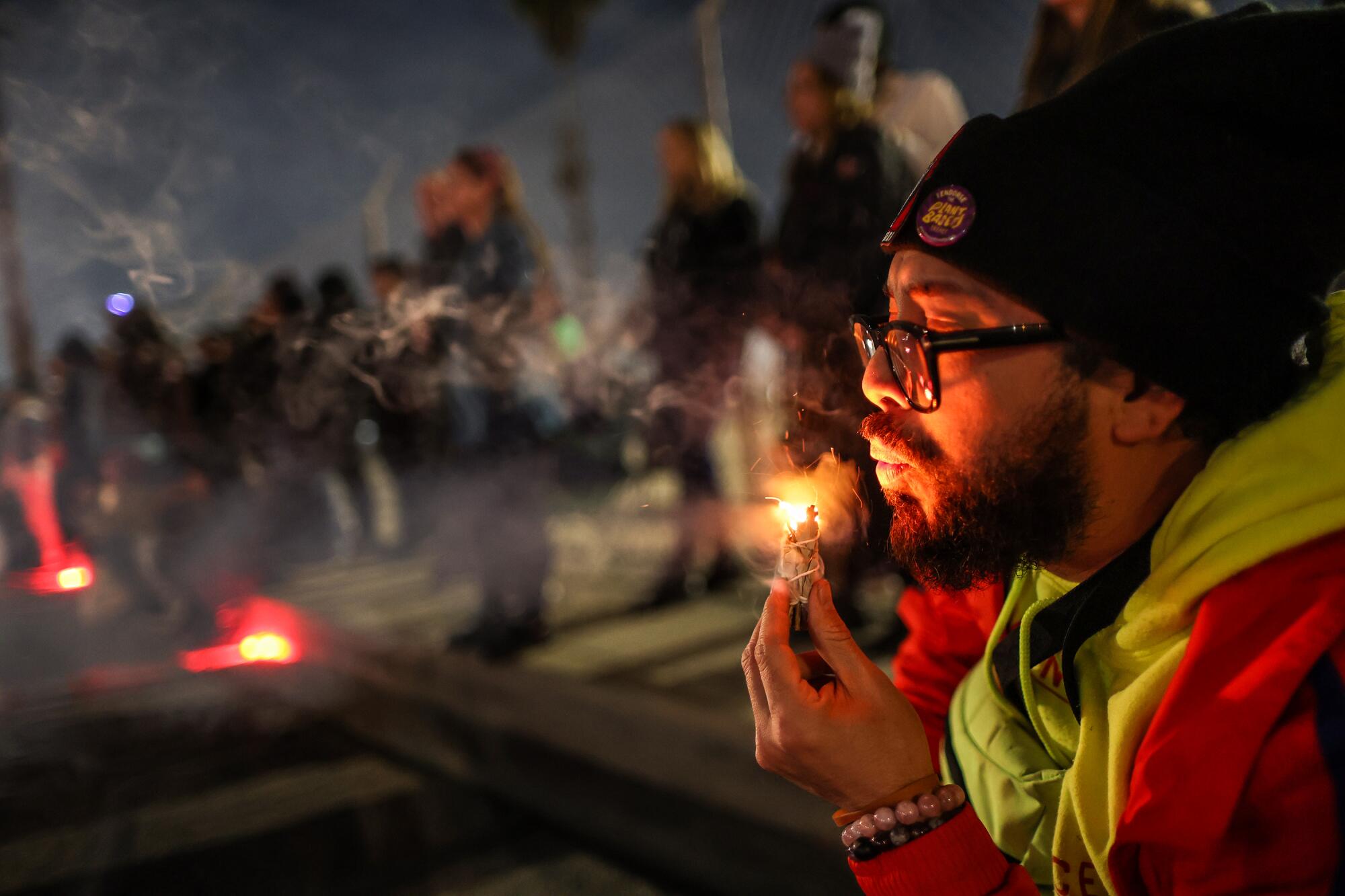
It was hard to hear anything due to traffic and the drone of Farmer John’s air filtration system. An array of speakers — old, young, Black, white, Latino — nevertheless recited poems, spoken word pieces, speeches written and improvised. They hailed veganism, decried factory farming and urged tolerance toward meat eaters.
“I’ve been avoiding coming to these vigils selfishly because I didn’t want to make eye contact with a pig and know I couldn’t do anything at the moment,” said actress Justina Adorno, who flew in that day from New York.
Melissa Olivos and her daughter, Jayleen, also showed up for the first time. She had brought vegan carne asada tacos from her Inland Empire chain, Viva Vegan.
“Everyone in my family hated me coming to holiday parties because I was that annoying vegan,” Melissa said, to knowing laughs. “So I thought, ‘If I start showing them that the food was bomb, then they would listen to me.’”
Her efforts were so successful that her mom, a former taquera, no longer eats meat. “Now she’s more vegan than I am. And I’m like, what?!”
“We could be out partying. We could be watching Netflix,” Olivos concluded. “But we’re out here, making a difference.”
Many neighbors of the Vernon slaughterhouse are glad to be free of its stench. However, the factory’s 1,800 to 2,000 workers are left wondering what’s next.
The talks went on for so long that the red hazard lights ran out of power, and the dozens of candles handed out to attendees around Hour 2 had melted into nubs by Hour 3. But few had left, and more were arriving by the time Acebedo asked for a moment of silence while a Sanskrit mantra played off a smartphone. It was 11:15 and getting chillier every minute.
The vigil concluded with a march to the corner of Vernon Avenue and Soto Street for a group photo in front of Farmer John’s infamous murals — the ones that show hundreds of happy pigs wallowing in mud or relaxing on grass alongside their ostensible owner. Afterward, attendees hung out to catch up and spend just a little more time together. This was it.
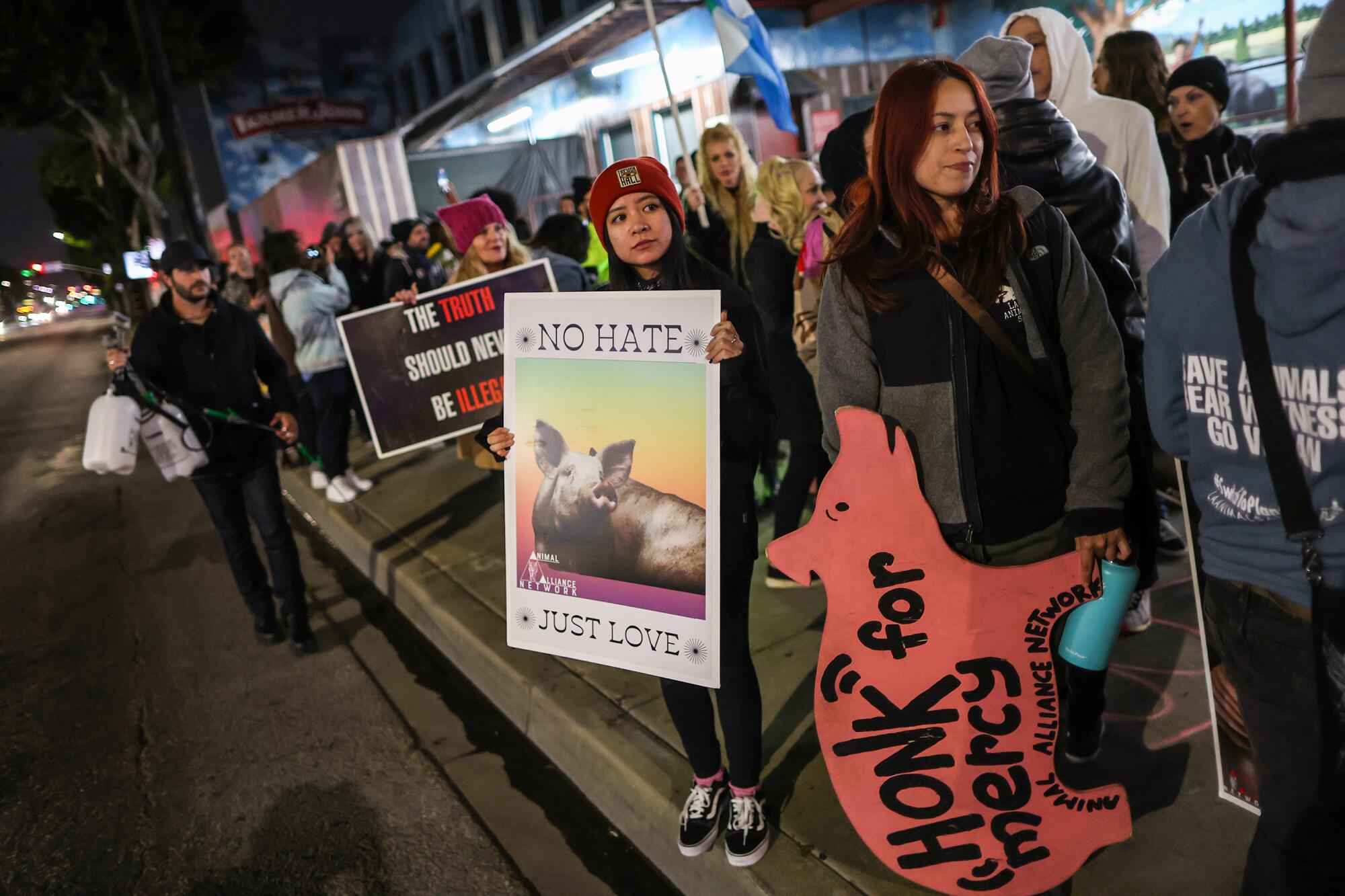
Minna Eisenhauer waved a green-and-blue flag with a white V. She had offered her animal sanctuary in Orange as a home for the last pig delivered to Farmer John.
Monroe, the Smithfield vice president of corporate affairs, declined the request, stating, “It would be a disservice to these farmers and the time and resources they have invested to raise these food animals to consider such a request.”
“They had a chance to show kindness and compassion — just that one little thing,” Eisenhower said. “And they didn’t.”
Christin To and Sara Cruz stood near anti-Farmer John slogans chalked onto the sidewalk.
“I was emotionally scared to come, but this community is great,” said To, who is from Thousand Oaks.
“Wow, you drove really far to get here!” remarked Cruz. Then, she pondered the future.
“I hope this slaughterhouse can be turned into something compassionate,” the Glendale resident said. “A museum, a gallery. Put in life and love, not a place filled with death.”
More to Read
Sign up for Essential California
The most important California stories and recommendations in your inbox every morning.
You may occasionally receive promotional content from the Los Angeles Times.
